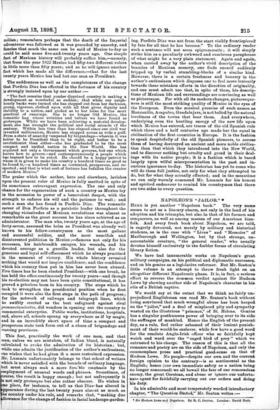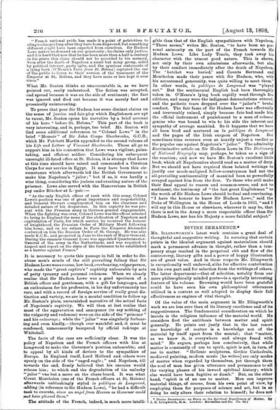NAPOLEON'S "JAILOR." •
HERE is yet another " Napoleon book." The very name seems to act as a litecary charm, not only in the land of his adoption and his triumphs, but also in that of his foemen and conquerors, as well as among masses of our American kins- folk. And every fresh book about Napoleon, we are told, is eagerly devoured, not merely by military and historical students, as is the case with " Lives " and " Memoirs" of Marlborough and Wellington, but by that strange, un- accountable creature, " the general reader," who usually devotes himself exclusively to the feebler forms of circulating library fiction.
We have had innumerable works on Napoleon's great. military campaigns, on his political and diplomatic successes, and on his genius as a legislative reformer. But Mr. Seaton's little volume is an attempt to throw fresh light on an altogether different Napoleonic phase. It is, in fact, a serious effort to reverse the common verdict against Sir Hudson. Lowe by showing another side of Napoleon's character in his role of a British captive.
We would say at the outset that we think no fairly un- prejudiced Englishman can read Mr. Seaton's book without being convinced that much wrongful abuse has been heaped on the "jailor," and a deal of misplaced pity and sympathy wasted on the illustrious " prisoner," of St. Helena. Genius has a singular posthumous power of bringing over to its side the suffrages of mankind. Hence the English of the present day, as a rule, feel rather ashamed of their lenient punish- ment of their would-be enslaver, while few have a good word for the resolute Anglo-Irish officer who so faithfully kept watch and ward over the " caged bird of prey " which we entrusted to his charge. The reason of this is that all the romance and poetry are on the side of Napoleon, and only the commonplace prose and practical good-sense on that of Hudson Lowe. No people—despite our own and the current foreign opinion to the contrary—is so sentimental as the English; hence (our own immediate safety as a nation being no longer concerned) we all bewail the fate of oar remorseless enemy, the great Corsican, and abuse or ignore our unfortu- nate agent for faithfully carrying out our orders and doing his duty.
In his admirable and most temperately worded introductory chapter, "The Question Stated," Mr. Seaton writes :— * Sir Hudson Lowe and Napoleon. By R. C. £ eaton. London : David Nutt " French national pride has made it a point of patriotism to ,cling to charges long after they have been disproved, but something different eight have been expected from ourselves. Sir Hudson Lowe makes -no demand on our generosity ; he claims only justice, and it is hard'that now that he has been more than a half-a-century in his grave this claim should not be accorded to his memory. Soon after the death of Napoleon a small but noisy group, aided by political interest, party spite, and the spurious statements of a lying book [O'Meara's Voice from St. Helena] captured the ear of the public to listen to their version of the treatment of the Emperor at St. Helena, and they have more or less kept it ever .since."
What Mr. Seaton thinks so unaccountable is, as we have pointed out, easily understood. The fiction was accepted, and spread because it was on the side of sentiment; the fact was ignored and died out because it was merely fact and prosaically uninteresting.
To prove that poor Sir Hudson has some distinct claims on the sense of justice and fair-play which Englishmen are apt to vaunt, Mr. Seaton opens his narrative by a brief account 'of his hero " before St. Helena." This part of the book is very interesting, and is, perhaps, too brief. Mr. Seaton will find some additional references to "Colonel Lowe" in the brief "Memoir" of Sir John Coape Sherbrooke, G.C.B., which Mr. Patchett Martin appended to the second volume of his Life and Letters of Viscount Sherbrooke. These all go to support him in his contention that Lowe was a vigilant, pains- taking, and efficient soldier. Considering his subsequent 'unsought ill-fated office at St. Helena, it is strange that Lowe at this time should have raised and commanded a Corsican Corps for our service in Egypt. It may have been this cir- cumstance which afterwards led the British Government to make him Napoleon's "jailor ; " but if so, it was hardly a wise thing, considering the jealous and exacting nature of the prisoner. Lowe also served with the Hanoverians in British pay under Bliicher at L ..psic :—
" As the only English officer of rank with this army, Colonel Lowe's position was one of great importance and responsibility, and General Stewart complimented him on the clearness and detailed nature of his despatches. In this capacity he was pre- sent with the Prussian army in thirteen general engagements. When the fighting was over, Colonel Lowe was the officer selected to bring to England the news of the abdication of Napoleon and capitulation of Paris, for which service he received the honour of knighthood, the Prussian Order of Military Merit following him home, and on his return to Paris the Emperor Alexander conferred on him the Russian Order of St. George. He was also made K.C.B., and promoted in June to the rank of Major-General. During the summer General Lowe was appointed Quartermaster- General of the army in the Netherlands, and was required to inspect and report on the state of the fortresses to be established as a barrier against France."
It is necessary to quote this passage in full in order to dis- abuse men's minds of the still prevailing fallacy that Sir Hudson Lowe was a coarse, low-bred, overbearing, vulgar person, who made the "great captive's" captivity unbearable by acts of petty tyranny and personal rudeness. When we clearly realise that Sir Hudson Lowe was a good specimen of a British officer and gentleman, with a gift for languages, and an enthusiasm for his profession, in his day unfortunately too
rare, and with a record of foreign service of really great dis- tinction and variety, we are in a mental condition to follow up
Mr. Seaton's plain, unvarnished narrative of the actual facts of Napoleon's captivity. We will then at last realise that
most of the aggravation and annoyance (to say nothing of the vulgarity and rudeness) were on the aide of the "prisoner " and his entourage ; while the " jailor " was singularly forbear- ing and even kindly,—though ever watchful and, it must be confessed, unnecessarily hampered by official red-tape at Whitehall.
The facts of the case are sufficiently clear. It was the
policy of Napoleon and the French officers with him at Longwood to make the Governor's position unbearable; and to appeal by all kinds of devices to the sympathies of Europe. In England itself, Lord Holland and others were openly on the side of the "caged eagle ; " and Napoleon, till towards the end, firmly believed that his enemies would release him; to which end the degradation of his unlucky
44 jailor " wits but a move on the chess-board. It was what The attitude of the French, indeed, is much more intelli- gible than that of the English sympathisers with Napoleon. "There seems," writes Mr. Seaton, "to have been no per- sonal animosity on the part of the French towards Sir Hudson Lowe. Like Lady Teazle, they took away bis character with the utmost good nature. This is shown, not only by their own admissions afterwards, but also by their conduct immediately after the death of Napoleon. The hatchet was buried,' and Counts Bertrand and Montholon made their peace with Sir Hudson, who, with his accustomed generosity, was quite willing to meet them." In other words, in politique de Longwood was "played oat." But the sentimental English had been thoroughly taken in. O'Meara's lying book rapidly went through five editions, and many were the indignant denunciations uttered, and the pathetic tears dropped over the "jailor's " brutal conduct. The fair fame of Sir Hudson Lowe was effectually and irrevocably ruined, simply because fate had made him the official instrument of punishment to a man of colossal genius who was bound to win to his side the interest and sympathy of average mankind. So it happens that we have all been bred and nurtured on in politique de Longwood and the pages of the Irish surgeon of Napoleon. But sometimes time reverses even so heavily unjust a verdict as the popular one against Napoleon's " jailor." The admirably discriminative article on Sir Hudson Lowe in The Dictionary of National Biography may, perhaps, be taken as a sign of the reaction; and now we have Mr. Seaton's excellent little book, which all Napoleonites should read as a matter of duty. But we should not have required these belated writings to justify our much-maligned fellow-countryman had not the all-prevailing sentimentality of mankind been so powerfully arrayed against him from the first. To those who still make their final appeal to reason and common-sense, and not to sentiment, the testimony of "the last great Englishman" to the worth of Sir Hudson Lowe should be final and convincing. "I have the honour to know Sir Hudson Lowe," said the Duke of Wellington in the House of Lords in 1833, "and I will say in this House or elsewhere, wherever it may be, that there is not in the Army a more respectable officer than Sir Hudson Lowe, nor has his Majesty a more faithful subject."



































 Previous page
Previous page